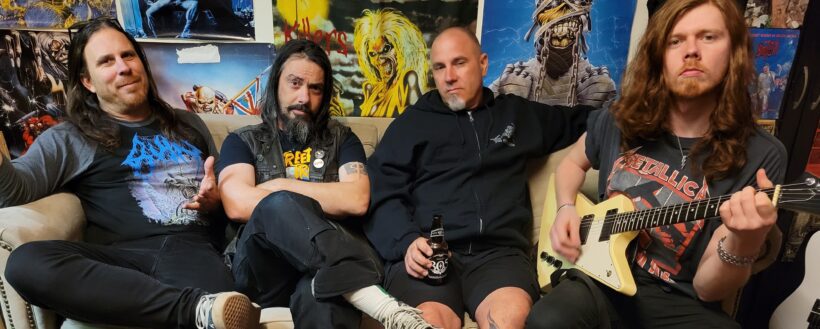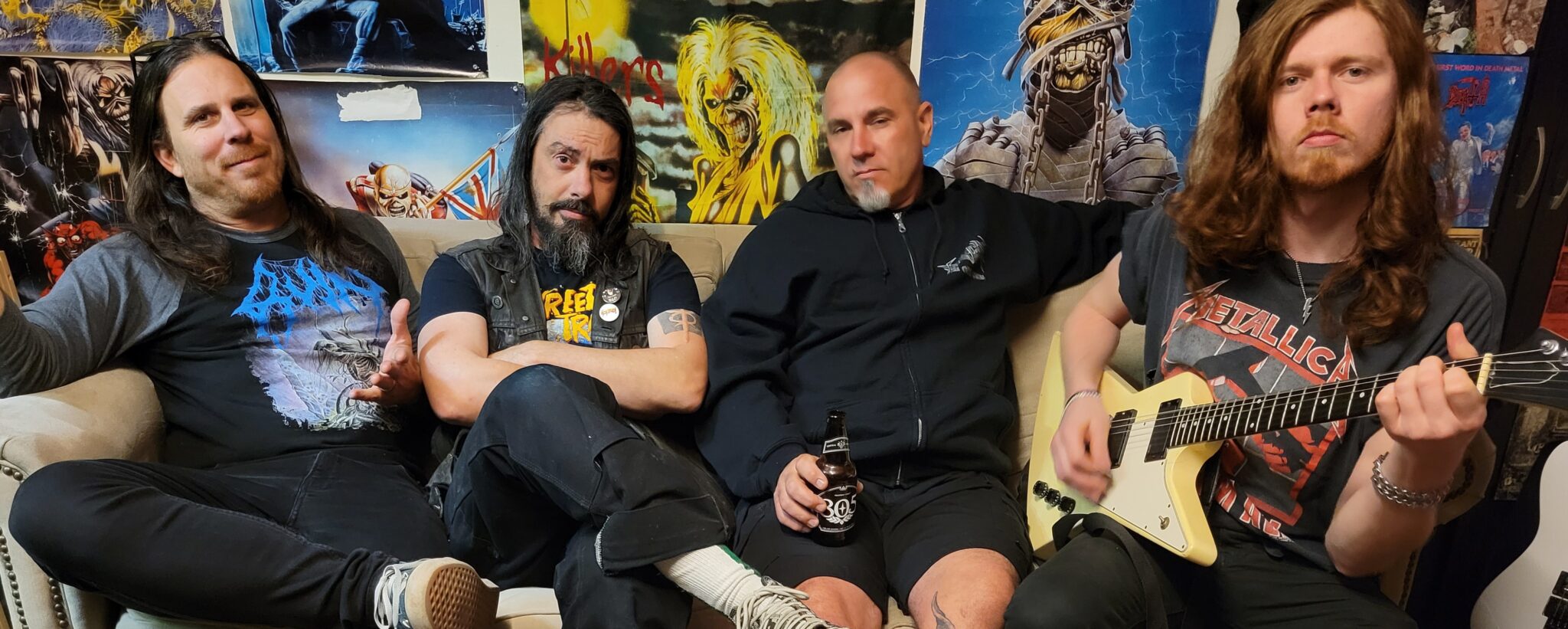
How did the idea for the film come together?
MATT HARVEY: We knew the 25th anniversary of Gore Metal was coming up. We planned to build a tour around it and get the earlier records pressed. It seemed a good way to encapsulate what we’ve done and where we’ve been. Ross (Sewage, bassist) agreed we shouldn’t do the interviewing. We have our ideas about the story and narrative. We’re too close to it. We only thought of Avinash and Andrew when we thought of the people who should do it. They agreed to get involved and have helped elevate the project.
Andrew, you’ve done a podcast and were a music writer. Avinash is also a published music writer and a touring metal musician. Have either of you worked on a film before?
ANDREW CORSON: I went into this assuming I could do what I know how to do: have good conversations. I’ve known Matt, Ross, and Col (Jones, original drummer) for decades. It sounded fun, and I’ve seen enough documentaries to know it’s all about good questions. I was comfortable knowing this was about getting the story from people who lived it.
AVINASH MITTUR: I’ve done plenty of interviews, the best of which are conversations. I’ve also seen plenty of rock documentaries. With every interview I did (for the documentary), I prefaced it by asking for as much detail as possible. Sometimes, I just needed to shut up and let people do their thing. The art of interviewing was the same for this documentary. We just had to remember the visual aspects and how it would look on camera.
The best documentaries aren’t about the footage or soundbites but about telling a story. With that in mind, what is Exhumed’s story, and how did you tell it?
MITTUR: Andrew did the initial interview with Matt. So we looked at that and the initial history of the band. The conclusion we came to was that the story was about relationships. This was about a group who started a band as kids and grew into it. It’s also about Matt finding a lineup that would work and allow the band to be what he wanted. Some members left on not-awesome terms. There are band members who came back. We tried explaining how these relationships grew and matured from teenagers to grown men.
CORSON: It made sense to focus on relationships because I knew the origin story. These relationships were formed in those formative years. This band has been going on for a long time. I witnessed what happened with these relationships, especially when Col’s relationship with Ross disintegrated. That theme was appropriate, and listening to all these different perspectives was profound.
What did you think about focusing on relationships, Matt? Ultimately, the community is what keeps extreme music going.
HARVEY: I thought it was the right move. One of the things we prized from the beginning was that we were friends. Initially, I was the most ambitious, but I always felt it was important to have personal relationships and play with people I liked and respected. When you are in a band, you spend a lot of time with people. The relationships keep everything going when a show sucks or your van breaks on tour and during whatever snafus and pitfalls come along. If you are playing arenas, you can get your own bus. You will hit a brick wall in the underground if you don’t like the people you play with. The band might be more popular now than ever, but it’s also more fun. We can do more now, but we still have a familiar relationship.
Some metal bands find that it becomes a slog. Their creative energy is sapped, and it becomes just a gig.
HARVEY: It doesn’t feel like that most of the time. We still have fun with this band and are excited to get together. Within reason, we can do a lot of things.
What archival information did you have on Exhumed, and how did you give it to the filmmakers?
HARVEY: I didn’t watch a lot of footage. There is a guy named Jesse Davis in the Bay Area who has been filming since the mid-90s. A few years ago, I asked him to go through tapes and give me everything on a hard drive for a lump sum. It was great to have an archive, whether for YouTube or sitting around laughing. When we started the documentary, I just tried to assemble the footage. I didn’t want to be too hands-on. The point of doing this was to do it warts on all. It did give me a better perspective on what the fuck I’ve been doing since high school (laughs). Andrew and Avinash helped us navigate a lot of this footage.
MITTUR: (Videographer) Frank Huang at Relapse deserves much credit. We aren’t videographers. I don’t know how Frank did it, but he found these amazing moments from the video and photo archives. Frank deserves so much credit for this coming to life; otherwise, I’d be teaching myself to use Adobe Premiere (laughs).
CORSON: I would not have taught myself to use Adobe Premiere (laughs). The film wouldn’t have happened! I didn’t realize this project’s size when we took it on. I did some substantial pieces. Avinash traveled, paid for many things, hunted people down, and put in hours of work. At one point, I said this thing needed a project manager, and Avinash volunteered. If it weren’t for him, this wouldn’t have happened.
How did you all wedge this project into your busy lives with jobs and music?
MITTUR: It was like being in a band; communicate your availability and schedule.
CORSON: Most of what I did was long interviews on weekends. The trickiest thing was finding when people weren’t out on tour.
Matt, I imagine when you started this, you didn’t think anyone would make a documentary on Exhumed. Yet here you are three decades later.
HARVEY: I try to keep some distance from those thoughts. I honestly feel fortunate because plenty of people go whole hog into music and aren’t in my position. Through a combination of persistence, luck, and a few good riffs, we are still in a position where people give a shit. I have realized that Exhumed is in the stage of our lifespan where maybe albums aren’t as important as they were. Maybe it’s a better use of our time talking about things people already have a connection to.
Did the three of you grow closer while making the film?
MITTUR: I feel like I’ve grown closer to Matt. Andrew is one of my best friends. Regardless of the documentary, we still have our hangouts every few weeks. But I feel like I’ve grown a lot tighter with Matt.
HARVEY: One of the best ways to maintain friendships is to work on something together. I was already friends with Andrew and Avinash; Andrew was there when we recorded Gore Metal. We got these guys because it was about who we knew, trusted, and respected. We have the same familial approach to this project as the band.
CORSON: I don’t get to see Matt very often. Just looking at some of the rough cuts, it was remarkable to hear these stories and remember my own experiences with these guys. Doing this made me proud of these guys and all they’ve accomplished.


